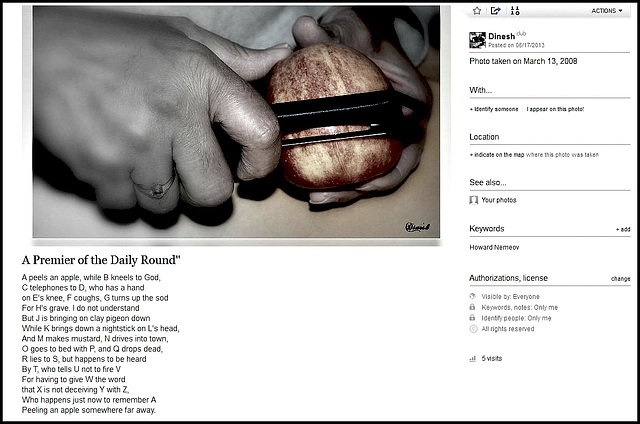See also...
Keywords
Authorizations, license
-
Visible by: Everyone -
All rights reserved
- Photo replaced on 30 Sep 2014
-
98 visits
Conversation / Social beings


It seems to be unique, language appears all the more miraculous. Other species bark and scream, grunt and wail, but none speak. …… However, neither monkeys nor apes have language in any sense that we would recognize from our everyday experience of human conversation.
How did it come about that we, the descendants of just such dump apes, have this extraordinary power when they do not? The puzzle seems all the greater because we feel so at home with the social lives of monkeys and apes. …….
The answer to this apparent puzzle lies, I suggest, in the way we actually use our capacity for language. If being human is all bout talking, it’s the tittle-tattle of life from the lips of the Aristotles and the Einsteins. We are social beings and our world - no less than that of the monkeys and apes - is cocooned in the interests and minutiae of everyday social life. They fascinate us beyond measure.
Let me give you a few statistics to reinforce the point. Next time you are in a café or a bar, just listen for a moment to your neighbours. You will discover, as we have in our research, that around two-thirds of their conversation is taken up with matters of social import. Who is doing what with whom, and whether it’ good or a bad thing, who is in and who is out, and why, how to deal with a difficult social situation involving a lover, child or colleague. You may happen on a particularly intense exchange about a technical problem at work or a book just read. But listen on, and I’ll wager that, within five minutes at the most, the conversation has drifted away again, back to the natural rhythms of social life. ~ Page 4 / 5
How did it come about that we, the descendants of just such dump apes, have this extraordinary power when they do not? The puzzle seems all the greater because we feel so at home with the social lives of monkeys and apes. …….
The answer to this apparent puzzle lies, I suggest, in the way we actually use our capacity for language. If being human is all bout talking, it’s the tittle-tattle of life from the lips of the Aristotles and the Einsteins. We are social beings and our world - no less than that of the monkeys and apes - is cocooned in the interests and minutiae of everyday social life. They fascinate us beyond measure.
Let me give you a few statistics to reinforce the point. Next time you are in a café or a bar, just listen for a moment to your neighbours. You will discover, as we have in our research, that around two-thirds of their conversation is taken up with matters of social import. Who is doing what with whom, and whether it’ good or a bad thing, who is in and who is out, and why, how to deal with a difficult social situation involving a lover, child or colleague. You may happen on a particularly intense exchange about a technical problem at work or a book just read. But listen on, and I’ll wager that, within five minutes at the most, the conversation has drifted away again, back to the natural rhythms of social life. ~ Page 4 / 5
- Keyboard shortcuts:
Jump to top
RSS feed- Latest comments - Subscribe to the comment feeds of this photo
- ipernity © 2007-2024
- Help & Contact
|
Club news
|
About ipernity
|
History |
ipernity Club & Prices |
Guide of good conduct
Donate | Group guidelines | Privacy policy | Terms of use | Statutes | In memoria -
Facebook
Twitter

For a communication system to qualify as a language, it must use symbols, and these symbols must be organized into sequences using syntax, which is a set of rules that enables a user to generate as effectively infinite number of meaningful utterances using finite number of symbols. //We have just examined the evolution of symbol use, of which words are just one variety, and seen how challenging it is to reach a sound conclusion. Syntax is an even knottier problem, partly because linguistics are not even certain about what kind of thing syntax is -- a generally based rule generator, a culturally learned set of rules, or both. Two facts about syntax suggest that it is rooted in some kind of genetic predisposition shared by all humans: (a) all human languages are mutually translatable, which suggests that they must share a basic logic; and (b) very young children learn the rules of syntax effortlessly without the necessity of direct instruction, which shows that children come endowed with a basic template already in place. Ever since Chomsky’s (1957)’Syntactic Structures,’ Linguists have searched for the features of this “universal grammar” and not found them. Despite being mutually translatable, language present a huge variety of syntactical rules, and it has proven impossible to distill them into a simple set of shared features to of all. What we do know is this: language use syntatical rules to generate sequences of symbols (words), and the syntactic rules are powerful enough that all normal users can generate entirely new sequences never before produced. It is this novel sequence generator that makes language such as powerful tool for communication and thought. ~ Page 185
Sign-in to write a comment.